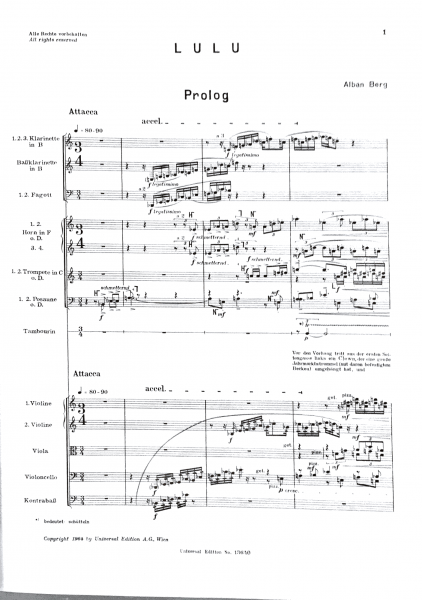[contextly_auto_sidebar]
“They”means conductors. “Don’t do it” means that when they conduct Lulu, they don’t follow the markings in Berg’s score.
I’ve posted about that, after seeing the movie-theater stream of the Met’s new Lulu. But now I’ve gotten the Lulu full score from the Juilliard library, and looked at it while I listened to some recordings.
And the problem is worse than I thought.
On Facebook, I went on at some length about this, but I’ll keep it simple here. In the prologue to the opera, just 4 1/2 minutes of music, there are many places where Berg wants the music to slow down, or speed up, or to be sung and played quietly. And on the recordings i sampled this morning — including the one Boulez conducts — almost none of this happens. (The others were conducted by Jeffrey Tate and Stefan Anton Beck.)
As a result, the music sounds undifferentiated. Just one thing after another. Hard to follow, hard to understand. And most of the opera sounds that way, because what doesn’t happen in the prologue keeps not happening throughout.
And thus we think the opera is difficult. Which in many ways it is. But it would seem less so, wouldn’t it, if all the light and shade Berg put into the score came across in performances?
It’s worth asking why this happens, why the markings in the score — so many of them, on page after page — aren’t followed.
With much sympathy for everyone performing this piece, I can think of one explanation: triage. The music is so hard to learn, so hard to play, that you reach a point of diminishing returns. Just to get the basic shape of the music is difficult. So to start to add nuance would impose a huge burden, even maybe distract the singers and the players from getting the notes right.
Once a quite famous conductor told me something like this, off the record. He said that, in both Lulu and Wozzeck, the best approach was to work carefully on the parts that already were going well. And to let the rest just take care of itself, trusting that, as the orchestra musicians got familiar with the music over many years, a chance would come to do careful work throughout each piece.
I can be hugely sympathetic with that. But still we should know that when we hear these operas — and especially Lulu, which is quite a bit harder to play and sing than Wozzeck — we’re not really hearing what Berg wrote.
This would make such an effective podcast. You’d hear a recording of the Lulu prologue. I’d use the Boulez one, because if even Boulez doesn’t follow the markings in the score, that’s serious. While the recording played, you’d hear me, in a voiceover, say what’s in the score. “Slow down here…very soft here…” And you’d hear how these things don’t happen. I’d love to do this, but I doubt I’ll have the time.
From long ago I remember that Dohnanyi’s recordings of Wozzeck and Lulu are shining exceptions to what I’m saying here. As I remember, he does follow the markings. I had these recordings on LP, and long ago lost track of them. I’ve ordered Lulu on CD, and if it’s as good as I remember, I’ll report on that here.


Might be worth trying to find out if all the markings you see in your score actually make it into the orchestra musicians’ parts.
Do Berg’s estate and the publisher still have enough control that there’s only one authorized edition of printed orchestral parts available?
I’m willing to bet that the Met would NOT allow its librarians to release the orchestral parts to you (especially as long as Levine is still there), even for such a worthwhile scholarly endeavor. Sounds like a great PhD project, though. Know any students who’d like to take it on, or seek out a set of parts from another opera company?